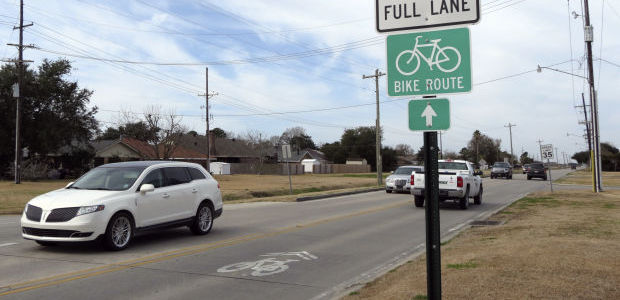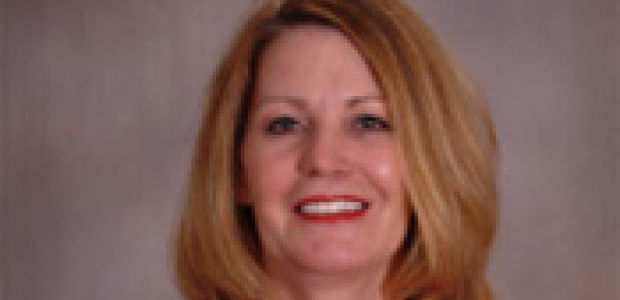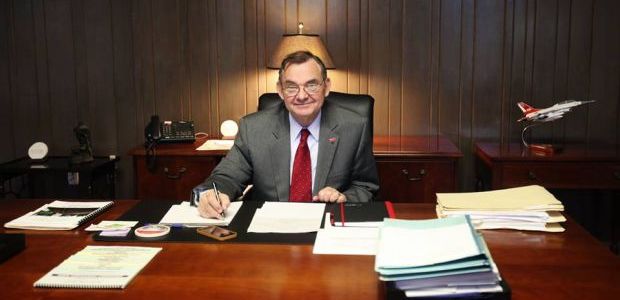
Cyclists, motorist share the road on Southdown Trail
January 22, 2014
Randolph to rework cabinet, again
January 22, 2014Nicholls State University is investigating the merits of a masters-level English program and a four-year criminal justice degree as it seeks to boost enrollment while maintaining admission requirements, President Bruce Murphy told the school’s faculty on his second day on the job.
Murphy has become Nicholls’ leader following an extended period of change and at the juncture of how the southeastern Louisiana four-year university should proceed forward amid new financial realities. Admission benchmarks have curtailed first-time freshmen enrollment, further cutting revenue as drastic cuts to state funding resulted in layoffs, cut programs and underpaid faculty.
Murphy, interviewed after his inaugural State of the University speech in a Talbot Hall corridor, zeroed in on ways to increase freshmen enrollment: program creation, international-based partnerships at home and abroad, recruitment of military veterans and service members, and hyping and enhancing the programs and skills that make the university and region unique.
“Sometimes we have to go where the light is not so good,” Murphy said, relating a tale about a boy who searched for a lost contact lens in a spot that was well lit rather than the spot where he lost it. “Sometimes we have to look in other places to find where the students are.”
Murphy was selected in September to replace Dr. Stephen Hulbert, who served for a decade, and took office one week ago. Murphy said he visited Nicholls’ campus several times after the University of Louisiana System Board of Supervisors announced his hiring, staying in Thibodaux during the university’s homecoming week and holding meetings and workshops with faculty and the institution’s leadership on subsequent visits.
The key to surveying the university, its people and their ideas, he said, was he didn’t make any decisions. Murphy is still transitioning from a state of inquisition to declaration, but he began outlining some of his priorities and his vision for the future.
“We need to do those things that we can do very well and leverage other programs off of that,” said the new president, dressed in a charcoal suit with a red tie and a “Nicholls State University” pin on his lapel. “People aren’t going to pay a lot of money – I don’t want to offend anybody, but – to go to Omaha to cook their cuisine, but they will come to this part of the world to do that,” Murphy said. “They’ll come from France. They’ll come from Europe. They’ll come from China. I think we have to get that word out; that’s a very important thing.”
Murphy also said petroleum, maritime and geomatics programs should be highlighted as they are uniquely geared to the region’s economy. Dialogue with industrial leaders should continue to ensure the programs remain in touch with reality, he added.
Nicholls began transitioning from open admissions after the 2004-05 year. Now, first-time freshmen younger than 25 must have at least a 21 composite score on the ACT and starting next year, lack the need for any remedial courses.
“(Admission standards are) probably the right way to go,” Murphy said. “I’m not smart enough about it yet to know, but I know the faculty are happy to have higher academic standards. They would rather work with students who are more prepared than students that they have to spend time with remedial with. … I think that increasing academic standards is a good thing. How that works with the numbers, we can figure that out.”
First-time fall freshman enrollment dropped by 32.8 percent between 2004 and 2013, according to institutional research figures, as those students’ average ACT score rose from 19.7 to 21.7. First-time fall freshmen enrollment in 2013 was 1,060, according university figures.
As enrollment dropped, the admission pool became diversified. From 2004, the share of out-of-state attendees rose by 2.3 percent and international enrollees by 1.5 percent to comprise 5.14 and 2.6 percent, respectively, of the fall 2013 student body.
Meanwhile, 67 more students (218) began the fall 2013 semester in full-time graduate-level studies than in 2004. However, when including part-time students, the total number of graduate-program enrollees declined by 47 students (648) over that time, according to institutional research.
The decline in enrollment has come at a time when state universities are increasingly relying on tuition and related fees to pay for operating costs. Through the Grad Act, state officials have allowed schools to increase tuition on an annual basis provided the institutions score well on a series of accountability metrics. But the hikes do little to offset fewer taxpayer dollars if enrollment is in decline.
From 2008-09 to 2012-13, state support to Nicholls State University fell by $17.9 million, or 50 percent. In addition to imposing a salary freeze on all non-promoted personnel, the university eliminated 33 faculty positions, or 12 percent, over that time and cut its operating budget by 11 percent since 2010-11.
“That model has changed,” Murphy said. “It’s changed. It’s not just this region, it’s not just Louisiana, it’s the United States. So we do have to look for other ways, we have to look for private industry, unfortunately we have to put some of that back on the students – so tuition rises – and the reason is because somebody has to pay for it.”
During his speech to faculty, Murphy said the university “must ascribe to” avoiding employee layoffs. He said afterward university leaders will look into adjusting faculty pay rates.
“The faculty here haven’t had a pay raise in years, five or six years,” Murphy said. “It gets to be frustrating. They’re here because they love to be here; they’re here because they love to teach. Many are here because this is home, family is here, they’ve always been here. But at some point in time, you cease to attract high-quality folks from outside. We’ve got to look at that”
To further leverage it’s offerings and increase funding, Nicholls will continue to partner with community colleges and four-year universities, Murphy said.
“This state is a little unique in the way it has divvied up who gets what, and they’ve put emphasis on community college and taken that away, in some sense, from the four-year schools,” Murphy said. “I don’t have a tremendous problem with that, because that’s the way it is. … But what do (community colleges) do? We need to have programs that support what they’re doing. … We have to say, ‘What can we do well? How can that feed us?’”
Nicholls until 2010-11 offered a two-year program in criminal justice. After the program was cut, students were routed to Fletcher Technical Community College. Stakeholders have expressed interest in reprising the program with a four-year degree, and Nicholls will investigate whether it’s feasible, Murphy said. Offering a master’s degree in English would likely be done in coordination with the University of New Orleans if it transpires, he added.
Murphy also lauded Nicholls’ affiliation with the Intercollegiate Consortium for a Master of Science in Nursing, which allows students at participating universities to learn from colleges that have their own specialties, in effect pooling knowledge and resources.
Further, the incoming president harped on his roots as a potential asset to Nicholls. Murphy was last at Air University in Alabama, a community college for airmen. Military veterans and service members, equipped with government benefits and, as Murphy tells it, a hankering for educating themselves, could help boost enrollment numbers while not necessarily straining the bricks-and-mortar infrastructure.
“Every year (at Air University, in Montgomery, Ala.) we graduate between 17- and 20,000 airmen with a community college degree,” he said. “I think that’s a big market. That’s a community college that most people don’t even know about, so if we can deliver programs – principally online – but if we can have a few programs to tap into places like that.
Maritime programs and curricula that emphasize leadership skills could entice such a population, Murphy said. Nicholls’ reputation as a Military Friendly School – named one by G.I. Jobs magazine for five consecutive years – wouldn’t hurt those ambitions.
“Where we have an advantage is if we can develop unique programs that appeal to big numbers of veterans that they can start online. Maybe eventually they will come here, but a student is a student. They pay tuition and they don’t wear and tear, they don’t use the gym, they don’t take a parking place.
“I think we need to look at attracting technically qualified, managerial, quote-unquote leadership types, and if we can go in that area, I think we can corner the market. I really do. That’s a tremendous growth opportunity for us.”
Dr. Bruce Murphy began work as Nicholls State University’s president last week.











